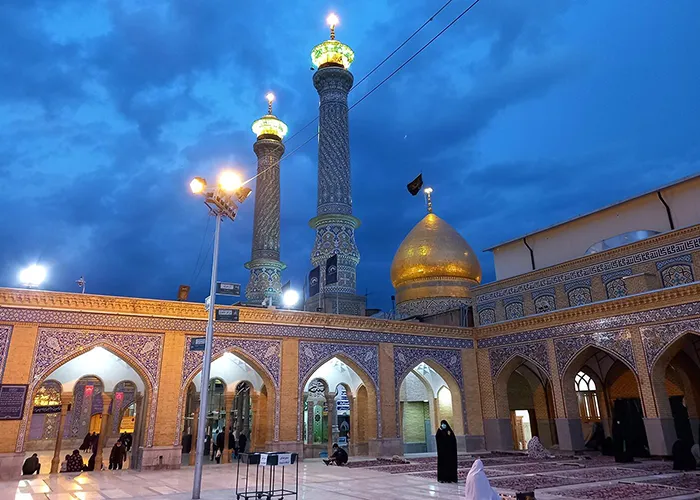Editorial – volume02 Issue15
Knowledge That Illuminates the Soul: Honouring the Legacy of Abdul Azim al-Hasani (as)
Introduction
As we transition into the post-Ramadan season, our attention turns to the timeless legacies of those whose lives were devoted to divine knowledge, sincerity, and service. Among them stands Hazrat Abdul Azim al-Hasani (as)—a noble descendant of Imam Hasan (as), a trustworthy narrator, and a paragon of scholarly piety. His remembrance is more than a historical commemoration; it is an invitation to realign our understanding of knowledge as a sacred trust that refines the heart and uplifts the community.
In a world where knowledge is often pursued for status or utility, Hazrat Abdul Azim’s life reminds us of the Qur’anic view that true knowledge is a path to taqwa—God-consciousness—and to meaningful human flourishing. His example urges us to ask: Does our knowledge bring us closer to Allah SWT? Does it inspire humility, service, and ethical clarity?
Commemorating a Scholar of Faith: The Death Anniversary of Hazrat Abdul Azim al-Hasani (15 Shawwal)
Hazrat Abdul Azim al-Hasani (as), widely known for his scholarly depth and spiritual discipline, played a unique role in preserving the teachings of the Ahl al-Bayt (as). So trusted was he by the Imams that Imam Ali al-Hadi (as) directed followers to seek guidance from him, saying:
“If you face any religious matter, refer to Abdul Azim al-Hasani.”
This trust was not only due to his lineage but to his ethical embodiment of knowledge, which he pursued and transmitted solely for the sake of Allah.
The Qur’an highlights the elevated status of scholars whose hearts are filled with reverence for their Creator:
إِنَّمَا يَخْشَى اللَّهَ مِنْ عِبَادِهِ الْعُلَمَاءُ
“Indeed, only those who fear Allah, from among His servants, are those who have knowledge.” (Surah Fatir, 35:28)
This verse reveals that true scholarship is inseparable from khashya—a deep, awe-filled consciousness of God. Hazrat Abdul Azim (as) was the embodiment of this verse. He was not merely a transmitter of information, but a vessel of divine consciousness. His learning was never self-serving—it was a means of purification and nearness to Allah.
The spiritual reward for such sincerity in learning and teaching is described beautifully in this profound hadith of Imam Sadeq (as):
مَن تَعَلَّمَ العِلمَ و َعَمِلَ بِهِ و َعَلَّمَ لِلّهِ دُعِىَ فى مَلَكُوتِ السَّماواتِ عَظيما فَقيلَ: تَعَلَّمَ لِلّهِ و َعَمِلَ لِلّهِ و َعَلَّمَ لِلّهِ (شرح اصول کافی، ج۱، ص۵۶)
“Whoever learns knowledge, acts upon it, and teaches it for the sake of Allah will be called ‘great’ in the kingdom of the heavens. It will be said: ‘He learned for Allah, acted for Allah, and taught for Allah.'”
Hazrat Abdul Azim’s life is a luminous illustration of this hadith. Every stage of his relationship with knowledge—learning, practising, and teaching—was rooted in sincerity (ikhlas). He did not seek worldly honour, but divine proximity and community upliftment. His presence was not just intellectual—it was moral and spiritual, a guiding force for those around him.
Relevance for Muslims in the West Today
For Muslims living in Western societies—where knowledge is often separated from Islamic values, and spirituality is seen as private or optional—the legacy of Hazrat Abdul Azim is a critical reminder. It challenges us to reintegrate ethics and spirituality into our intellectual lives, whether we are studying theology, science, education, or social work.
True Islamic scholarship is about forming God-conscious humans, not just skilled professionals. When knowledge is pursued and shared for Allah, it transforms not only individuals but entire communities.
Practical Challenge for the Week
This week, reflect on your approach to knowledge—whether you’re a student, a teacher, a community leader, or a parent. Choose one area of knowledge and ask:
Am I learning, practising, or teaching this for Allah’s sake?
Discuss your answers with a friend, student, or child. Let this reflection become a small but transformative act of sincerity.
news via inbox
Subscribe to the newsletter.




